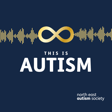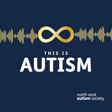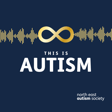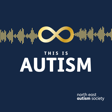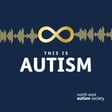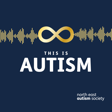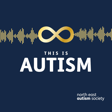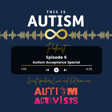Become a Creator today!Start creating today - Share your story with the world!
Start for free
00:00:00
00:00:01

3. Sex and relationships
Sex and relationship coach Ness Cooper - herself autistic - talks about sex education for autistic adolescents and how parents can broach the topic with young people. She also dispels the myths around sex and autistic people in her discussion with our Family Development Kerrie Highcock.
Music: Aukestra
Editing: Niall Hegarty
Transcript
Introduction and Guest Overview
00:00:01
Speaker
much bigger message of autism acceptance and challenging the negative narrative isn't it? We can't make someone conform to how we want them to communicate and that's okay to worry that our children are growing into adults but it's normal for them to grow up.
00:00:19
Speaker
it's definitely a to-be topic so it's important to keep up by education around these areas because it's like there's always going to be some barriers.
Ness Cooper's Career in Sexology
00:00:28
Speaker
Hi everybody and welcome to This Is Autism podcast. My name is Kerry Highcock and I'm the Family Development Manager at the North East Autism Society and today we're going to be talking to Ness Cooper around sex and relationships.
00:00:43
Speaker
So, Ness, lovely of you to join us. I'm really excited about this topic. Could you just tell us a little bit about you before we get started with the questions? Hello, everyone. So, I'm Ness Cooper. I'm a clinical sexologist. I'm trained in sex education, sex therapy and sex coaching.
00:01:01
Speaker
And basically, I know a lot about sex and relationships from teens up until whatever age and any questions you've ever thought of, I've probably got an answer that may be helpful or put you in the right direction.
Importance of Discussing Sex and Relationships
00:01:18
Speaker
So, Ness, why did you get into this area of specialism?
00:01:24
Speaker
When I was 15 I ended up reading a Johnson's and Master's book and I thought oh that's amazing and stuff like that. Before then I used to be like interested in like various areas because I'm autistic so I get like special interests like so
00:01:45
Speaker
vegetarianism was one that was big for like about four years. And another one was neuroscience and things like that. But for some reason, sex and relationships stuck after then. But I asked my school careers counselor if it was a real career like sex therapist or relationship therapist, and they said, No, it's not. So I took a weird way to actually get where I am of doing like little bits of courses here and there at first and just discovering myself and blogging and going to talks and
00:02:14
Speaker
I've just managed to get here. Brilliant. Well, we're really excited to have you here. And I think, I think why, you know, I kind of have got my own ideas around this, but why do you think it's important that we talk about sex and relationships? You know, because I suppose it can be a little bit of a taboo word for many people. It might be something that don't feel comfortable talking about, but you know, in your experience, why is this important?
Barriers for Autistic Individuals in Sex Education
00:02:40
Speaker
Well, sex and relationships are important because basically it's a big part of our overall wellbeing and even those who identify as asexual, which means that they don't look for sexual experiences that are physical generally,
00:02:59
Speaker
although they may have them, but we'll talk about that at some other point. But it's like when people's sex and relationships, life is disrupted and their wellbeing disrupted in that way, it affects their overall wellbeing. And the same with their overall wellbeing can affect the sex and relationship wellbeing the individual has. And it's just a very important part of who we are.
00:03:23
Speaker
And I mean, do you still think, well, do you believe that it's still a bit of a taboo topic to talk about sex? It's definitely a taboo topic. It changes quite...
00:03:35
Speaker
Interestingly, like, our parents probably had different forms of taboos around sex and relationships, and those can still carry on for generations and affect people. And as new generations are like getting to the stages of exploring sex and relationships have been new taboos forming as well. So it's important to keep up like education around these areas, because it's like there's always going to be some barriers
00:04:03
Speaker
and accessibility issues due to these taboos and stigmas and there's always going to be questions and answers that need to be given and explained and stuff because of the taboos and things.
00:04:19
Speaker
And, Ness, when you spoke about barriers then, because obviously we're talking about autistic people in this podcast, are there specific barriers, do you think, that exist specifically for autistic people around sex and relationships?
00:04:35
Speaker
I think because of sex and relationships having kind of like a lot of barriers because of abuse and that and also section 28 didn't help where there was a lot of restrictions on what could be said and that now that we've got the new curriculum formed
00:04:52
Speaker
in the past two years, that's going to be helpful because it does teach educators to go into various learning styles that should help people who don't have a diagnosis yet or are still going through diagnosis process.
00:05:07
Speaker
Generally, individuals who are autistic in that will have gaps in education in general. They're waiting for EHC plans and things like that. We're taking quite a long time to actually get these to
00:05:24
Speaker
for the children and even older adults waiting for diagnosis as well. Plans in place that they may need, the support they may need to help them be able to actually even attend curriculum-based classes such as relationships, sex education.
00:05:43
Speaker
Some autistic individuals may find that they need different support during different classes. So some may need emotional support, some may need to have time away during gaps so they're not overwhelmed in that. And because we are taking ages to get these plans in place, these kids aren't being allowed that when they may need that to process information and stuff. So there are those barriers.
00:06:13
Speaker
I also think because there's a big area about disability in sex where people with disabilities are seen as asexual automatically or they're either seen as hypersexual. So some people take the approach that if we don't talk about it, it's better because then
00:06:35
Speaker
if they feel it's safer but that's the reverse of safeguarding
Training Educators for Inclusive Sex Education
00:06:39
Speaker
completely. We should be talking about these matters and I think there's still that stigma around disability, around autism and that we need to shift away from to give people the opportunity
00:06:55
Speaker
to learn and be educated and be able to have informed education where they can learn about consent, privacy and then themselves as well in the process and that.
00:07:13
Speaker
There is definitely barriers and I feel like I could actually probably ramble a lot about it because I just see it so often. I have attended various trainings and connected with various people who some of them have said I work with SEND children, I work with
00:07:33
Speaker
autistic teens and that and they're on the training which is great but a lot of the people who are around them in those care settings or education settings and that are saying oh we shouldn't teach them this or they don't teach them the correct education because they're like oh they won't understand it and that and that's that's not the point you still teach it it's still important it's still relevant
00:08:01
Speaker
Sometimes some individuals may need to have things explained to them multiple times. Sometimes individuals may need things explained to them a bit slower than others. But that's not inherently something to do with autism, because sometimes children just understand things differently or youth understand things differently. And us as adults understand things differently, even neurotypical adults do and may need things taught to them or explain to them differently anyway.
Autism Acceptance and Relationship Myths
00:08:31
Speaker
Yeah, absolutely. And when you talk about your training, because I'm really interested in this, because I think there is a massive need for the right education for all children. And then how might we need to differentiate that for autistic children? What training are you providing? Are you providing this training to teachers, support assistants?
00:08:54
Speaker
Currently, I train mostly therapists at the moment, but I do support other sex educators who go into schools because I've more gone on to the root of therapy now. So I will help with a few sex educators with their lesson plans and writing lesson plans and helping them that way now.
00:09:17
Speaker
I prefer personally to do college or university above if I'm going to do a talk in person nowadays but yeah I'm just always trying to highlight that whilst someone may be going into a school
00:09:35
Speaker
to teach let's say high school students and that it's important that you have as many different learning styles incorporated because you don't know who's going to be sitting there in your classroom and that who may be needed
00:09:50
Speaker
to learn things like in a more visual approach and more like hands-on approach and more verbal text approach and that so it's like just important to incorporate a bit of each and have multiple activities so maybe like at the start some kids won't understand what you're going on about in one activity but then you've got another activity going on a bit later where they can they get it a bit more for themselves personally and they can relate to it even
00:10:18
Speaker
and be able to communicate it in the way that they need to communicate it. Absolutely. And it's not about forcing communication, like a standardised communication, and it's important to highlight privacy and consent, of course, throughout. But from my experience as a therapist as well, seeing often generally older individuals
00:10:41
Speaker
and that we all have our own ways of communicating and there's no standard of communication. As long as things are consensual and safe, that's important.
00:10:52
Speaker
Yeah, and I think absoluteness, I think as well what you're talking about when I'm kind of hearing is that much bigger message of autism acceptance and challenging the negative narrative, isn't it? And misconceptions, if we talk about relationships, misconceptions like autistic people don't want friends, they don't want to be in relationships when actually that's totally inaccurate. It's just that friendship might look different, relationships might look different too.
Differentiated Sex Education for Teens
00:11:19
Speaker
from a non-autistic perspective, but that doesn't mean that that's wrong. So a lot of this feels like, you know, it is about that undercurrent, isn't it, of misunderstanding, you know, when you were talking about communication differences, everybody has their own valid way of communicating. That may not be speech, it might be the written word, you know, it could be anything. And it's about how can we adapt what we do as practitioners or educationalists to meet the child halfway rather, or the young person halfway?
00:11:49
Speaker
Yeah definitely finding with young people and like teens and like university students and that that we don't want to rush them as well. Rushing doesn't seem to work it seems to
00:12:05
Speaker
We need to go at their pace. We can't put them to our pace because, again, we're standardizing it. We're giving them our own standards and that like you should be at this stage when technically we all know that stages are kind of like they're invented by just a group of people and that they're all different for everyone. So, yeah, and I think just listening as well is important.
00:12:35
Speaker
And answering questions when needed. Don't feel like you have to be the sole educator as well. It's important because sometimes
00:12:47
Speaker
we will learn things a bit easier from different people and that's perfectly okay.
Parental Challenges in Sex Education
00:12:53
Speaker
It's always they're doing a safe and consensual and approach and that like friends can be a good like let them talk to their friends as well because I know there's some people I've spoken to like
00:13:05
Speaker
oh they shouldn't talk this to their friends at all and that and I'm just like no that's kind of a normal developmental stage that's a safe area where they can discuss things a bit more safely and things sometimes and that because it can be a bit overwhelming and scary particularly with adults so yeah and being if you're a parent as well talk about it with them if they ask don't say I'm not going to talk about it
00:13:33
Speaker
That was going to be my next question around how do parents sometimes feel around this idea of the young people having access to a curriculum around sex education? Is there barriers and challenges from a parental perspective?
00:13:53
Speaker
I find that parents, sometimes they may have a misunderstanding about what's taught in the curriculum. Like, when teaching youth and that, I wouldn't be teaching them or talking to them about the things I would talk to someone over 18 about. And also, sex education isn't about telling children what they should be doing because that's sexualizing them.
00:14:21
Speaker
it's like given the resources that they may need to make sure they're safe and you never do it in a way that's going to be like make them feel they have to conform to things and you don't do anything overly explicit. I know there's a lot of threads online that think that it's all about explicit and that but generally there's a big focus on like
00:14:46
Speaker
making sure you feel safe in yourself, making sure people around you feel safe. And that's like a big part of the education. Feel confidence is a big part, self esteem, it all interplays into this. And whilst there may be some kind of scary seeming topics every now and again, they're not
00:15:09
Speaker
they're not sexualized in the way that some resources out there may be like stating and that it's just like honest down to us like information and it's like
00:15:24
Speaker
Yeah.
Unlearning Harmful Scripts in Adulthood
00:15:26
Speaker
I think that's really useful for you to try and help clarify that for families actually, Ness, because I think there is a worry of what is our children, young people getting taught in education. On that note, obviously you touched on
00:15:40
Speaker
adults, and I'm quite interested just to understand what would you support adults with? Because I know you mentioned last time we spoke around interpretations of pleasure. Talking on this podcast, some people might be like, where are we going with this? But how does that differ from, obviously,
00:16:03
Speaker
it's very different working with children. But when we're talking about adults, what kind of work would you be doing there? So with adults, often I'm helping them learn about scripts or routines that they've been taught that work against them.
00:16:18
Speaker
accepting themselves generally. And often that is actually due to a lack of sex education or not having enough people to talk to about things when they needed to at younger developmental stages. So that's why youth sex education is actually very important because it gives them individuals a chance to discuss that.
00:16:39
Speaker
And there's a lot of like things are produced by like how we think we should be acting and that and generally most of the time you look at have a discussion with someone and you find out they've been beating themselves up due to something they thought was wrong and generally know what they're doing is perfectly fine as long as it's
00:17:04
Speaker
in private it's consensual and stuff like that and it's like I know it probably sounds quite easy saying oh I'm just making them realise that those things are in play
00:17:19
Speaker
and that, but it can actually take quite a long time because psychologically things can build up and we form our own barriers as social barriers.
Misinterpretations of Autistic Behaviors
00:17:31
Speaker
There's also other expectations we have within our own personal relationships at play and stuff like that. So
00:17:38
Speaker
it's just getting people to be comfortable in themselves generally. And when it comes to pleasure and stuff, that may be like talking to someone and like saying to them, yes, it's okay to enjoy your body. And yes, that's fine. And that and then also I have noticed with some of my past
00:18:09
Speaker
experiences in teaching and stuff that there is a slight difference some with some not all neurodivergent individuals where there's a confusion because of masking. And there's also another confusion because of how some neurodivergent individuals new sensation and that
00:18:32
Speaker
in a different form of relief relief as well and stuff and not a sexual way. But there can be like a lot of conflict because they've been told never to like stim, for instance. And that can weirdly cross over into like how they also want to use their body in other ways as well because they've been told not to do it in one way.
00:18:57
Speaker
I think that's interesting talking about stimming as an example. I know in the past I've had experiences where adults have been told that they're being sexually inappropriate in some way. However, it was actually not at all. It was a sensory seeking that this individual wanted to rub fabric.
00:19:20
Speaker
But immediately people get labeled as, you know, sexually inappropriate, sexual deviant. You know, these awful labels that get stuck on people when actually it's about understanding what the person is getting from that experience, isn't it? I think is that what you're trying to say, Ness?
00:19:36
Speaker
Basically, and I don't think the DMS has played a good part in any of that because basically, that's a diagnostic manual that if anyone isn't aware, that's been around for quite a long time now. And it's fetish sized and sexualized things that are generally common behaviors. And it's not helpful.
00:20:02
Speaker
No. Well, I think, you know, we could have a whole podcast series on the DSM, couldn't we? And how actually it's not helpful for many individuals, let's just say.
Resources for Parents on Sex Education
00:20:16
Speaker
Have you heard about the North East Autism Society's Family Development Team? We offer support to autistic people and their families before, during or after diagnosis. We have toddler groups, family workshops, support hubs and home visits. And we also have a private Facebook group you can join called Family Networking, where you can share experiences, tips and support with other families just like you.
00:20:41
Speaker
Find us on Facebook under North East Autism Society Family Networking or on our website at www.ne-as.org.uk
00:20:58
Speaker
Hi everybody, Kerry Highcock here from the Northeast Autism Society. We're back for the second part of our This Is Autism podcast and we are joined with the lovely Ness Cooper talking about sex and relationships. So Ness, I just wanted to
00:21:15
Speaker
Have a little chat for parents really, because we get a lot of families that come to us and ask questions around sex and relationships, particularly sex education. So how can parents broach the topic of sex education with their children? Is there an adolescence, is there a way of doing that?
00:21:34
Speaker
Well, if you're thinking about talking about sex and relationships with your young person at the moment, they've probably already started having questions about what you want to discuss with them. So they, they aren't going to be taken by surprise, as such, by it, if you're worried about like, shocking the dynamic a little bit and weirding your kid out, it would be fine on that front.
00:22:01
Speaker
I think giving them the option to have multiple forms of information is good because maybe on a particular day of deciding today's today, I'm going to do it because it can be a bit nerve wracking to have this conversation and that. Making sure that you don't set it to that particular day if they're not ready for it.
00:22:21
Speaker
even you manage to discuss a little bit about it like you can signpost them to for instance there's a website called bish which is for youth and it's got lots of information so you can say oh okay we can't you we're not really ready to have this chat together today because
00:22:40
Speaker
maybe a bit stressed or life got a bit busy or something like that. But yeah, I just want you to be aware there's this website you can go check out. Bish also actually do do training for parents so you can learn about what's needed to be spoken about or what your kids or teens may have.
00:23:04
Speaker
Have you got the web address for that? Could you just tell us? I will actually. I'll just get that.
00:23:13
Speaker
Just because I think a lot of our families would find that quite useful. So if you don't mind just pulling that up and letting us know now, that would be very, very helpful. So anything, you know, where we can send practical signpost, practical advice would be quite very useful. Yeah. So bishtraining.com is one of the sites and that was that's not the youth one as such as the training one, but he
00:23:39
Speaker
Justin does have a signpost where to find the bit for your teens to go view and learn themselves as well.
Navigating Adolescent Sexuality
00:23:49
Speaker
He's got some resources as well there. Could you just spell that out for us? B-I-S-H-T-R-A-I-N-I-N-G.com
00:24:06
Speaker
Brilliant. Thank you for that. Fantastic. Any other tips for families if they're thinking about discussing this topic with the young people? Don't not answer questions. Even if it's out of your comfort zone, be prepared to answer some of it.
00:24:28
Speaker
Because while some of the topics that they may bring up and that may be a bit scary, maybe sit down with them on a safe search or something and go through some sex ed resources online and search something if you're together even, but confused. So I find that a lot of times not answering questions can lead to frustration, it can lead to
00:24:53
Speaker
Basically, people just, well, individuals, youth, even adults and that, just closing off a bit sometimes as well. So if you're willing to give some form of answer, that's better than none. Don't be afraid of them learning from
00:25:12
Speaker
school as well and ask them about their sex ed class in school like their sex and relationship class if they've had it because you're normalizing it as well partly because if you go how was English today
00:25:27
Speaker
the talk about that, then you can go, how was RSC today? Did you learn anything fun from that? So it's like not singling it out, you're like bringing it into the everyday, like let's say dinner table discussion or something, which is helpful.
00:25:46
Speaker
don't shame, focus on consent. If something is really worrying you and that, you can always seek advice from sex educators, from the school even, from
00:26:02
Speaker
go research stuff, if something's really worrying you, if you've got like a good healthcare provider as well, you can always go and have a chat with them. There's some issues and that that may be easier to go talk to sometimes a different person, just to get your head around it. Generally, I don't see any
00:26:27
Speaker
There's not many behaviors that are inherently at risk behaviors. It's when we start ignoring them and putting barriers up that causes at risk behaviors generally. So more conversation actually prevents that risk behavior.
00:26:42
Speaker
Yeah. And actually on that, Ness, you know, sometimes for adolescents, we get maybe queries around things like masturbation. You know, is it okay for my adolescent to do that? And parents getting quite stressed. Now, obviously, masturbation is a typical adolescent thing that people do. But I think it's the some
00:27:08
Speaker
any information or advice you could give around that, you know, families that are, you know, just trying to normalise it that it's actually, it's okay, as long as people are safe.
00:27:17
Speaker
So masturbation is perfectly healthy and it's very normal as you just said and I'm glad that you said that because I often get the opposite approach from a lot of people. Okay. So making sure that people are aware it's okay and that's fine.
00:27:39
Speaker
Sometimes it's like it's also we're a bit shaken as adults when our children are suddenly growing up as well. And that's okay to worry that our children are growing into adults, but it's normal for them to grow up.
00:27:56
Speaker
Teach them about privacy is definitely an important part. Consent's an important part. If you're concerned about the habits that they're doing, as always it's consensual and safe, that's private to them.
00:28:13
Speaker
So we have to kind of disassociate ourselves and move ourselves away from basically being a parent so much and understand they're going into an adult phase and that we don't need to know about that.
00:28:29
Speaker
So, Ness, it's been a very long time since I did sex education in school and I remember it. The bits I remember is the boys got a load of tampons and we're kind of sticking them up the nose and all this stuff. That's my memory of sex education. So now, is masturbation talked about within the curriculum? We talk about pleasure.
00:28:51
Speaker
And it will be dependent on where someone is in us because it's dependent partly on the school of how things are worded sometimes. So self-pleasure is being spoken about more. When I originally did training about 13 years ago, I remember we did
00:29:12
Speaker
a separate unit and it was all on self-pleasure and a lot of people there doing the training were scared of incorporating that because of where they were teaching and stuff. I think there's still some of that even though we are teaching about like the importance of being aware that
00:29:38
Speaker
as individuals we may or the teens may explore themselves and stuff and it is being discussed more. I just think whilst there is a curriculum, it came in at an awkward time of the pandemic and some places are still being a bit slow implementing bits and that.
00:30:06
Speaker
What about one of the questions I get asked a lot is around sexuality. For adolescents that are growing up and find out who they are developing their identity,
00:30:20
Speaker
Have you got any, if so, if a young person approached their parents and said, you know, I am gay or I am bisexual or I think I am gay or I think I am bisexual, how can parents support that discussion?
Research on Gender Differences in Autism
00:30:35
Speaker
Is there anything you think that they could do?
00:30:37
Speaker
Acceptance is key because basically, again, shame, stigma in there is where people end up just ending up not being able to express themselves further and it can cause a load of issues later on in life. So be accepting.
00:30:58
Speaker
Don't shame. Try avoid doing little jokes. It may seem easy to do that, particularly as on TV there's an abundance of LGBT seemingly tongue in cheek jokes, but they're not helpful, generally.
00:31:17
Speaker
Understand if you're worried that as long as they're supporting them, they're going to be okay. So that's very important.
00:31:31
Speaker
If you've noticed that they have said, oh, I'm like last year, they were one sexuality and then all gender and then this year change, it does understand that humans change and just accept them for who they are at this particular moment in their life and support them.
00:31:52
Speaker
Absolutely. And just on the gender, Ness, obviously I think there is increase in research around autistic people with gender differences. I'm going to use the word difference and please educate me on this if I'm using the wrong terminology.
00:32:11
Speaker
Am I right in thinking there's quite a lot of increase in research around autistic people and gender? We're finding that there is a large correlation of individuals who are non-binary and autistic. Non-binary means that they don't conform to social standards of male and female.
00:32:35
Speaker
Yeah, there's increased research, but part of this is probably due to we never did research on this before. And a lot of sex relationships and gender research in the past was only got through if it's like a heteronormative patriarchal kind of mindset. So there's probably a lot of things that we could have studied like
00:33:01
Speaker
20 years ago that would have shown us that there was a steady increase anyway or that there was like there's a study now showing for instance ADHD is linked to autism for some individuals and more willingness to do
00:33:24
Speaker
non-monogamous relationships, for instance, or accepting of non-monogamous relationships. But we never studied it up until recently. So we don't know what the statistics were 20 years ago. Yeah, so now it just feels like there's a surge in people that are autistic and have gender differences. It's a really difficult one, isn't it? And it's something I've been trying to get me head round because I'm not a specialist in this area.
Gender Identity Perceptions and Media Influence
00:33:53
Speaker
Can you just, so there's lots of labels, isn't there? There's lots of terminology now around, particularly around gender identity. So I'm going to give you a test here, Ness, just for our listeners, just to get a bit of an idea. So
00:34:09
Speaker
Asexual. What does asexual mean? So asexual is actually an official sexuality and it means that someone doesn't have an interest in physical sexual pleasure. They may still have sexo because of their partner. They may just see it as a recreational activity rather than erotic to just do with their partner, but they don't
00:34:36
Speaker
We don't get the erotic pleasure generally from it as many other individuals who are non-atesexual. Okay. And what about gender neutral? Gender neutral means that you don't conform to a particular gender. So generally in gender we have gender as a social construct and it has changed a lot over time. You can get into some big arguments about this.
00:35:06
Speaker
We don't argue on the podcast. I know that at the moment it's one of those things that it's very popular for people to argue on social media about and actually some parents will argue with teens about it too and again it's not an accepting approach and that is not helpful.
00:35:33
Speaker
So gender neutral, someone doesn't conform to society's gender, they aren't either male or female, and that's fine, they're just who they are.
00:35:47
Speaker
So I think families are trying to navigate through all of this. I suppose new language, it's certainly new language for me. And some families, and I'm not agreeing or disagreeing with this, I'm not giving my opinion, but a lot of families that I maybe speak to think it's a fad. So this discussion around the gender differences have now become a bit of a fad and it's cool to have a different gender.
00:36:16
Speaker
What are your thoughts on that, Ness? Generally, when something's seen as a fad when it comes to sexuality or sexual practice even, there's a big media influence as to why people are thinking that's a fad. And there can be a big political influence even. So if you're thinking that something may be a fad, think where did the influence of you thinking that's a fad come from?
00:36:46
Speaker
And there are trends, there always will be trends, but it's more important to focus on how someone interprets something for themselves and the importance to them when it comes to gender or relationship dynamic and that, how them as an individual or the people who are close to them intimately also interpret it. That's more important than focusing, that's a fad, no go.
00:37:13
Speaker
how important this is to
Challenges in Relationships with Autistic Individuals
00:37:15
Speaker
you. I understand this is important to you.
00:37:18
Speaker
Great. I've covered lots of stuff there, Nes, but before we finish, I just, I'm going a little bit off topic here. I just want to talk about relationships. So, you know, in relationships for autistic people, or, you know, if you were an autistic person in a relationship with a non-autistic person, perhaps, are there any particular issues that crop up between, you know, when we're looking at relationships for autistic people?
00:37:44
Speaker
Some couples that I've seen in the past, there can be a delayed processing of certain things and I find that that can be a big issue for some because
00:38:03
Speaker
We want instant answers sometimes for certain things, or we want someone to react happy or sad to something straight away. But when someone's neurodivergent, they may sometimes take a few days to process something and understand how they're feeling about something.
00:38:22
Speaker
I think it's, I generally end up teaching that we have different ways of processing, but also we have different ways again of communicating and we can't make someone conform to how we want them to communicate. It's like, I don't think forcing someone to rush themselves through these processes is healthy because it can cause a lot of conflict as well. So that's one.
00:38:51
Speaker
There can be also, because of individuals having to mask so much, I've found the sexuality and gender may suddenly feel like it changes for one partner who is neurodivergent, but really it's been in the background for them for so long that they've had to mask so much things. It's just gone into like, let's say they got a box or basket full of things that they mask and it's like,
00:39:20
Speaker
it's just gone into the mix as well and they're masking it along with the other things and that and it's always been there but it can be quite a shock to the people around them when in fact the the individuals probably thought about it for a very long time and it's finally got to a stage where I can't mask this anymore. Yeah that's that's really interesting that makes a lot of sense Ness actually when you when you look at autistic masking and you know people
00:39:48
Speaker
you know, getting rid of the mask to some extent, although I would argue that's very, very difficult to do.
Podcast Wrap-Up and Contact Information
00:39:55
Speaker
Yeah, that's actually just made a lot of sense for me, what you've just said around masking and how that interplay with sexual identity or gender identity. Yeah. And I think sometimes also I find some couples who, one's autistic and that, and even with
00:40:17
Speaker
younger couples as well. Not being able to go to the same social things together all the time because of being overwhelmed that can feel couples can sometimes feel a bit isolated each of them because of navigating how to navigate the not being overwhelmed and doing shared activities together. So
00:40:41
Speaker
Yeah, yeah, makes sense. Yeah, because actually, it's back to kind of that double empathy theory, isn't it, that Damian Milton describes around communication for two people, you know, that often the communication issues arise when you have a non-autistic person and an autistic person together in a room. Actually, autistic people, when they communicate together, they're absolutely fine. So I suppose if you're in a relationship as an autistic person with a non-autistic person,
00:41:09
Speaker
there can be real difficulties in communicating with each other. But then some might argue that that person is just an undiagnosed autistic person. It's a possibility. To be fair, I date an autistic individual. We go to social events like I've never been able to before, so that's quite amazing. We kind of ground each other.
00:41:36
Speaker
I do wonder about some of my past relationships too, getting a bit personal, a few that were a bit more successful in the past, but maybe they were undiagnosed. Perhaps, perhaps. Well, Ness, thank you so much for joining us. That has been really, really insightful and hopefully our listeners will take something from that. So thank you very, very much. And I'm sure we'll see you again soon.
00:42:08
Speaker
And if you've got any questions that you'd like answering or there's an issue you'd like to hear discussed, get in touch with us at info at ne-as.org.uk. You can find us now and subscribe wherever you normally get your podcasts or on our website at www.ne-as.org.uk forward slash podcast. See you then.
